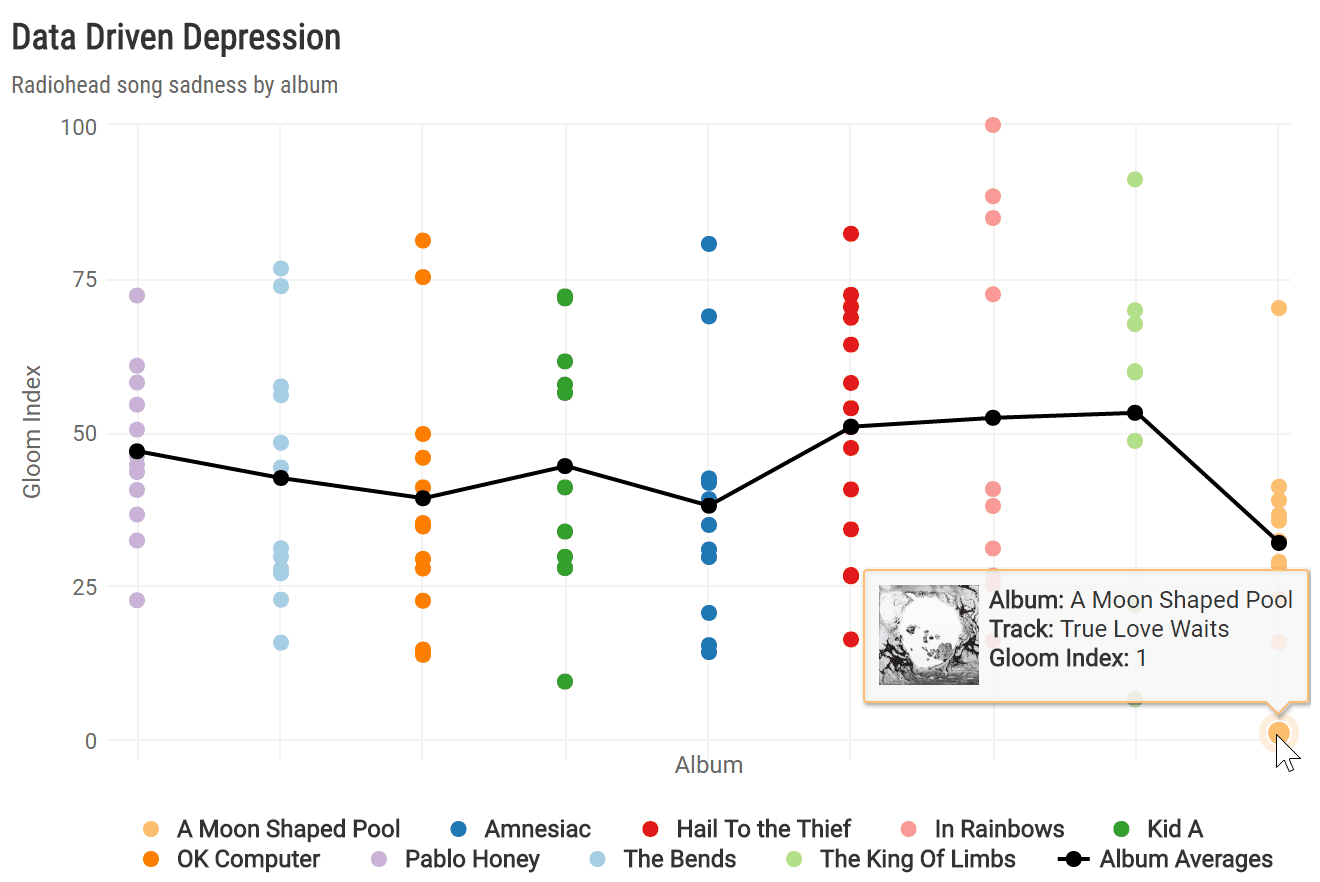One of my favorite music-themed comedy sketches of recent years features a support group of Radiohead fans flummoxed and disappointed by the band’s post-Ok Computer output. The scenario trades on the perplexity that met Radiohead’s abrupt change of musical direction with the revolutionary Kid A as well as on the fact that Radiohead fans tend toward, well… if not PTSD or severe mood disorders, at least a heightened propensity for generalized depression.
“Much of Radiohead’s music is undeniably sad,” writes Analytics Specialist and Radiohead fan Charlie Thompson. Rather than play something “less depressing,” however, as many an acquaintance has asked him over the years, Thompson decided “to quantify that sadness, concluding in a data-driven determination of their most depressing song.”
Now, purely subjectively, I’d place “How to Disappear Completely” in the top spot, followed closely by Amnesia’s “Pyramid Song.” But my own associations with these songs are personal and perhaps somewhat arbitrary. I might make a case for them based on lyrical interpretations, musical arrangement, and instrumentation. But the argument would still largely depend on matters of taste and acculturation.

Thompson, on the other hand, believes in “quantifying sentiment.” To that end, he created a “gloom index,” which he used to measure each song in the band’s catalog. Rather than listening to them all, one after another, he relied on data from two online services, first pulling “detailed audio statistics” from Spotify’s Web API. One metric in particular, called “valence,” measures a song’s “positivity.” These scores provide an index “of how sad a song sounds from a musical perspective.” (It’s not entirely clear what the criteria are for these scores).

Next, Thompson used the Genius Lyrics API to examine “lyrical density,” specifically the concentration of “sad words” in any given song. To combine these two measures, he leaned on an analysis by a fellow data scientist and blogger, Myles Harrison. You can see his resulting formula for the “Gloom Index” above, and if you understand the programing language R, you can see examples of his analysis at his blog, RCharlie. (Read a less data-laden summary of Thompson’s study at the analytics blog Revolutions.) Thompson also plotted sadness by album, in the interactive graph further up.
So, which song rated highest on the “Gloom Scale”? Well, it’s “True Love Waits” from their most recent album A Moon Shaped Pool (hear a live acoustic version up above.). It’s a damned sad song, I’ll grant, as are the nine runners-up, all of which you can hear in the YouTube and Spotify playlists above). “Pyramid Song” appears at number 5, but “How to Disappear Completely” doesn’t even rank in the top ten. From a purely subjective standpoint, this makes me suspicious of the whole operation. But you tell us, readers, what do you think of Thompson’s experiment in “quantifying sentiment” in music?
Here’s the top 10:
1. True Love Waits
2. Give Up The Ghost
3. Motion Picture Soundtrack
4. Let Down
5. Pyramid Song
6. Exit Music (For a Film)
7. Dollars & Cents
8. High And Dry
9. Tinker Tailor Soldier …
10. Videotape
via Kottke
Related Content:
Radiohead’s “Creep” Played on the Gayageum, a Korean Instrument Dating Back to the 6th Century
A Free Course on Machine Learning & Data Science from Caltech
Josh Jones is a writer and musician based in Durham, NC. Follow him at @jdmagness


Couldn’t agree more. “How To Disappear Completely” surely ranks higher, IMO and so does “Exit Music”. Interesting experiment, though.
“Last Flowers” is one that gets missed here, I think. I can barely listen to that anymore, especially the versions where Thom plays it solo on piano.
Love this article/the playlist. I would also put different songs on the list. It seems that the Gloom Index is eventually all about songs with a lot of minor chords, but I might be wrong (pun intended).
No “nude”. I am perplexed.
I was expecting to stumble into a beautiful forest of Fake Plastic Trees on this list🌲🌲🌲
What about “I Will” ? I find it extremely sad.
How I Made My Millions.
I’m not surprised no one has mentioned it since there are a bunch of sad songs and this one is an obscure B‑Side. But in my opinion this is the saddest Radiohead song I’ve ever heard.
I think many people haven’t listened to STREET SPIRIT or they don’t get the real feel. That songs is the saddest and most beautiful thing they have created. Thom Yorke accepts it.
Surely ‘Nude’ has to be there. Opening lines of ‘don’t get any big ideas. They’re not going to happen’ or ‘There there’ , ‘just because you feel it, doesn’t mean it’s there.’ Both have that helplessly depressing sentiment of no matter what you do you are doomed to failure.
what about ‘weird fishes/arpeggi’? it sounds uplifting upon the first listen, but when you take a look at the lyrics…
1. Pyramid song
2. A Reminder
3. I Will
4. Videotape
5. Sail to the Moon
6. I Want None Of This
7. Exit Music For a Film
8. Bishops Robes
9. True Love Waits
10. How to Disappear Completely